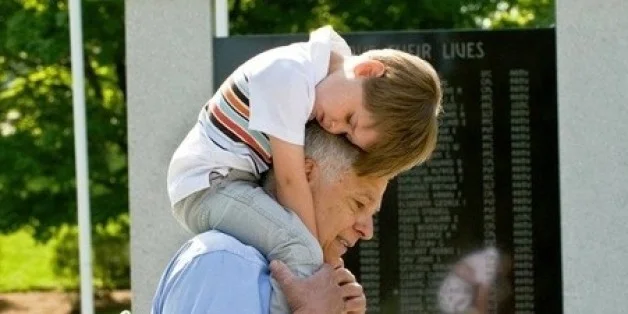In 2012, while my husband was on a yearlong deployment, I arranged for our three young boys to have dinner with a different person in the community each week. We called it “Dinner with the Smileys,” and our notable dinner guests were numerous — Senator Susan Collins, children’s book illustrator Scott Nash, author Donn Fendler, the Red Sox. But the dinner that changed our lives, the one we will never forget, wasn’t planned, and it included an elderly couple whose names the larger world would never know.
On April 22 of that year, the boys and I had just finished reading to patients at an assisted living facility, something I had promised my neighbor we’d do. Although it was nearly 6 o’clock and the kids were hungry, we did not plan to stay for dinner.
Residents shuffled past us with their walkers and canes. In soft, shaking voices, they thanked us for reading. My boys — Ford, 11; Owen, 9; and Lindell, 5 — were putting on their winter hats and gloves. They awkwardly nodded as the white-haired men and women went past.
At the end of the line was Frank, a small man permanently bent forward at his waist. He had wispy grey hairs combed over his bald, sun-spotted head. He stopped and touched my hand. “Will you have dinner with us?” he said quietly. “There’s room at our table.”
Anita — the taller, straighter woman beside Frank, who was clutching his elbow for support — smiled at me and said, “We’ll do some sorting. Would you like that? We can sort things together.”
Before I could say anything, Owen shrugged his shoulders and said, “Sure, what’s for dinner?”
I cringed because it had been a long day, and I knew I was on borrowed time. Dining rooms at assisted living facilities aren’t known for their speedy service. I could see the train wreck ahead of me: three hungry, impatient boys; one elderly, slow man; a room full of seniors.
But Frank was already leading the boys into the dining area. I watched as he walked crookedly to a table and pulled out a padded chair on wheels for me.
Anita had let go of Frank’s arm. She was sweeping across the room now like a ballroom dancer. She opened the bathroom door but didn’t go inside. She pushed the elevator buttons but didn’t get on. She sang and raised her hands in the air like a conductor.
Frank excused himself to go after his wife.
By now, the boys knew something was wrong. Their mouths hung open as they watched. They had never been around someone with Alzheimer’s before. In fact, they had probably never even heard the word. There was no time to prepare them adequately enough. Would they be scared? Would they feel uncomfortable?
Before Frank and Anita came back to the table, I quickly whispered to my boys, “Anita has memory problems. She will say and do things that seem strange. Just go along with it and don’t take anything personally.”
The boys slowly nodded.
Anita sat down next to Owen. When dinner came, he watched nervously out of the corner of his eye as she rolled pasta in her hands and painted the table with the sauce. She continued to sing, and she buttoned and unbuttoned her cardigan.
Anita offered Owen sauce from her fingers. “Want a taste, dear?” she said, holding out her trembling finger.
Owen shrugged. “I’m okay,” he said staring at his lap.
“We could paint,” Anita said.
“Um, no thanks.”
“Do you like to sing?” Anita asked.
“Um, I guess so. Well, not really,” Owen said. “Sometimes.”
He looked up at Anita’s eager, hopeful face and smiled.
Anita smiled back.
Throughout dinner, Frank often reached out to quiet his wife by touching her hand. He told us that they had been married 60 years. Anita didn’t know that now. She didn’t remember her five children either, and when my youngest son realized what that meant, he left his seat and crawled into my lap. Frank’s eyes grew wet as he told my boys that the only thing Anita remembers is that he is her best friend.
I thought about the irony, how Frank and I were both lonely, me because my husband was deployed and physically gone; he because of Alzheimer’s.
After dinner, Anita wanted to show us her “home.” Frank wasn’t sure which “home” she meant, but Owen said, “I’ll come see your home.”
Frank and Anita had separate rooms ever since her disease progressed and she needed 24-hour care. Frank visited her twice a day. “Sometimes she’s happy to see me,” he told us. “And sometimes, when she’s forgotten who I am, she isn’t.”
The boys walked slowly next to Anita down the hallway of the facility. The walls of her room were lined with framed pictures from their life together: their wedding day, their children, their grandchildren. Indeed, her entire life had been condensed and consolidated into a single room the size of a studio apartment. She had a bed, a television, a desk — and all those photographs that meant nothing to her now.
When Frank left to walk us to the lobby, Anita begged him not to go. “Are you coming back for me?” she asked Frank. “Are you coming tomorrow? To take me home?”
“Yes, Dear,” Frank said. “I’ll be back tomorrow, and we’ll go home.”
“Does she know which home you mean,” Ford asked as we walked away.
“No,” Frank said. “Probably not.”
The kids were unusually calm on the way home. They had many questions, and I tried to answer them as best I could. Mostly, however, they were worried about Anita and sad for Frank. We visited the couple several more times, once with my husband once he was home from deployment. And then, a year later, we learned that Frank had passed away. The boys cried as I told them.
“He did not go easily,” a friend who knew Frank said. “He didn’t want to leave Anita.”
The boys wanted to visit Anita, but we were told it was best not to. Without Frank, she didn’t know anyone anymore.
Today, when we pass by the assisted living facility, on our way to soccer, the grocery store or school, the boys still ask about Anita and reminisce about Frank. For one brief moment, our crazy, fast-paced life becomes still, and we remember. We remember that a world where youth is idealized and the elderly are forgotten is out of balance. We remember that true friendship conquers all, even when 60 years together has vanished. And we remember that life’s unplanned moments — like when we accepted an old man’s invitation to dinner — are the ones that change us forever.




